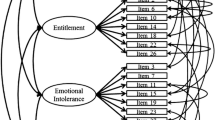Abstract
The present study examined the relationship between Frustration Intolerance Beliefs as suggested by the Rational Emotive Behavior Therapy framework and emotional problems. Data were collected from 332 university undergraduate students (age 19–26) who completed Demographic Information Sheet, Frustration Discomfort Scale and three subscales of Brief Symptom Inventory including depression, anxiety and hostility. The current findings confirmed the association between frustration intolerance and irrational beliefs and their respective roles in psychological distress among non-clinical student population. Results indicated that FDS subscales were differently related to specific emotions as entitlement and emotional intolerance sub-scales were significantly positively associated with depression, anxiety, and hostility while achievement was significantly negatively associated with hostility. The study has implications for counsellors, school psychologists and policy makers as it highlights the importance of rational group and individual counselling of rational ideas to reduce the emotional problems of students hindering their educational and personal growth.
Similar content being viewed by others
References
Bernard, M. E., & DiGiuseppe, R. (1989). Rational-emotive therapy today. In M. E. Bernard & R. DiGiuseppe (Eds.), Inside rational-emotive therapy: A critical appraisal of the theory and therapy of Albert Ellis (pp. 1–7). New York: Academic Press.
Bond, W. B., & Dryden, W. (2000). How rational beliefs and irrational beliefs affect people’s inferences: An experimental investigation. Behavioural and Cognitive Psychotherapy, 28, 33–43.
Brislin, R. W. (1980). Translation and content analysis of oral and written materials. In H. C. Triandis & J. W. Berry (Eds.), Handbook of cross-cultural psychology (pp. 137–164). Boston, MA: Allyn and Bacon.
Chang, E. C., & D’Zurilla, T. J. (1996). Irrational beliefs as predictors of anxiety and depression in a college population. Personality and Individual Differences, 20(2), 215–219.
Ciarrochi, J. (2004). Relations between dysfunctional beliefs and positive and negative indices of well-being: A critical evaluation of the common beliefs survey-111. Journal of Rational-Emotive & Cognitive-Behavior Therapy, 22(3), 171–188.
Cochran, C. D., & Hale, W. D. (1985). College student norms on the brief symptom inventory. Journal of Clinical Psychology, 41(6), 777–779.
David, D., Szentagotai, A., Eva, K., & Macavei, B. (2005). A synopsis of rational-emotive behavior therapy (REBT): Fundamental and applied research. Journal of Rational-Emotive & Cognitive-Behavior Therapy, 23(3), 175–221.
De Botton, A. (2000). The consolations of philosophy. London: Penguin.
Derogatis, L. R. (1975). Brief symptom inventory. Baltimore, MD: Clinical Psychometric Research.
Derogatis, L. R. (1993). BSI Brief Symptom Inventory: Administration, scoring and procedures manual (4th ed.). Minneapolis, MN: National Computer System.
Derogatis, L. R., & Melisaratos, N. (1983). The brief symptom inventory: An introductory report. Psychological Medicine, 13, 595–605.
DiBartolo, P., Frost, R. O., Peicha, C., LaSota, M., & Grills, A. E. (2004). Shedding light on the relationship between personal standards and psychopathology: The case for contingent self-worth. Journal of Rational-Emotive & Cognitive-Behavior Therapy, 22, 241–254.
DiGiuseppe, R. (1996). The nature of irrational and rational beliefs: Progress in rational emotive behavior therapy. Journal of Rational-Emotive & Cognitive-Behavior Therapy, 14, 5–28.
Dryden, W. (1999). Beyond LFT and discomfort disturbance: The case for the term “Non-ego disturbance”. Journal of Rational-Emotive & Cognitive-Behavior Therapy, 17, 165–200.
Dryden, W., & Gordon, W. (1993). Beating the comfort trap. London: Sheldon Press.
Ellis, A. (1979). “Discomfort anxiety”: A new cognitive behavioural construct. Part I. Rational Living, 14, 3–8.
Ellis, A. (1980). “Discomfort anxiety”: A new cognitive behavioural construct. Part II. Rational Living, 15, 25–30.
Ellis, A. (1995). Changing rational-emotive therapy (RET) to rational emotive behavior therapy (REBT). Journal of Rational-Emotive & Cognitive-Behavior Therapy, 13, 85–89.
Feldman, L. A. (1993). Distinguishing depression and anxiety in self report: Evidence from confirmatory analysis on nonclinical and clinical samples. Journal of Consulting and Clinical Psychology, 61(4), 631–638.
Harrington, N. (2005). The frustration discomfort scale: Development and psychometric properties. Clinical Psychology and Psychotherapy, 12, 374–387.
Harrington, N. (2006). Frustration intolerance beliefs: Their relationship with depression, anxiety, and anger in a clinical population. Cognitive Therapy Research, 30, 699–709.
Hocevar, D., & El-Zahhar, N. (1985). A paradigm for examining the psychometric characteristics of cross-cultural measurements. In H. M. van der Ploeg, R. Schwarzer, & C. D. Spielberg (Eds.), Advances in test anxiety research (pp. 203–214). Lisse: Swets & Zeitlinger.
Kassinove, H. (1986). Self-reported affect and core irrational thinking: A preliminary analysis. Journal of Rational Emotive Therapy, 4(1), 19–30.
Kassinove, H., & Eckhardt, C. I. (1994). Irrational beliefs and self-reported affect in Russia and America. Personality and Individual Differences, 16(1), 133–142.
Kendall, P. C., Haaga, D. A. F., Ellis, A., Bernard, M., DiGiuseppe, R., & Kassinove, H. (1995). Rational-emotive therapy in the 1990 and beyond: Current status, recent revisions, and research questions. Clinical Psychology Review, 15, 169–185.
Malouff, J. M., Schutte, N. S., & McClelland, T. (1992). Examination of the relationship between irrational beliefs and state anxiety. Personality and Individual Differences, 13, 451–456.
Martin, R. C., & Dahlen, E. R. (2004). Irrational beliefs and the experience and expression of anger. Journal of Rational-Emotive & Cognitive-Behavior Therapy, 22, 3–20.
Muran, J. C., Kassinove, H., Ross, S., & Muran, E. M. (1989). Irrational thinking and negative emotionality in college students and applicants for mental health services. Journal of Clinical Psychology, 45, 188–193.
Paunonen, S. V., & Ashton, M. C. (1998). The structured assessment of personality across cultures. Journal of Cross-Cultural Psychology, 29, 150–170.
Rorer, L. G. (1989). Rational-emotive theory II: Explication and evaluation. Cognitive Therapy and Research, 13, 531–548.
Stankovic, S., & Vukosavljevic-Gvozden, T. (2011). The relationship of a measure of frustration intolerance with emotional dysfunction in a student sample. Journal of Rational-Emotive & Cognitive-Behavior Therapy, 29(1), 17–34.
Watson, D. C., & Sinha, B. K. (1999). A cross cultural comparison of the Brief Symptom Inventory. International Journal of Stress Management, 6(4), 255–264.
Author information
Authors and Affiliations
Corresponding author
Rights and permissions
About this article
Cite this article
Jibeen, T. Frustration Intolerance Beliefs as Predictors of Emotional Problems in University Undergraduates. J Rat-Emo Cognitive-Behav Ther 31, 16–26 (2013). https://doi.org/10.1007/s10942-012-0154-8
Published:
Issue Date:
DOI: https://doi.org/10.1007/s10942-012-0154-8



